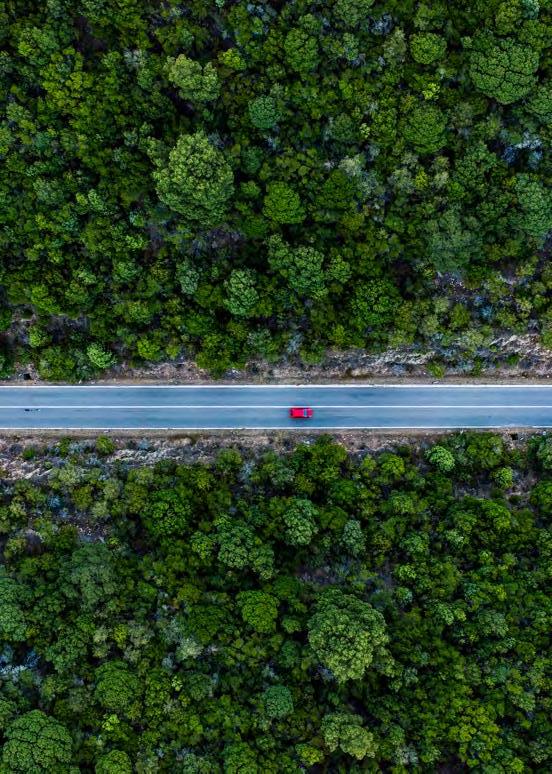
20 minute read
possibilities they can bring to ticketing
from IQ99
by IQ Magazine
BUILDING BACK GREENER
With the clock ticking on the climate time bomb, a growing number of touring professionals are looking to restart their operations in a more environmentally friendly manner. Jon Chapple speaks to the experts helping the live industry plan for a more sustainable future

GREENER


One of few feel-good stories that has emerged from the more than year-long shutdown of nearly all normal life is the perception that the natural world is getting a long-overdue ‘break’ from humanity. Emissions are down across the board, with 2.3 billion tons less carbon dioxide released into the atmosphere in 2020 alone, and the quality of rivers and other large bodies of water has improved: parts of India’s Ganges and Yamuna rivers, for example, have become fit for drinking for the first time in decades.
Against the backdrop of such positive developments, as well as a heightened public awareness of the worsening climate crisis, the imminent return of concert touring – with its trucks and planes, its waste and its thirst for energy – could be a turning point for live music’s relationship with the natural environment. This sense that the end of the pandemic is a fork in the road for the industry is heightened by the upcoming 26th UN Climate Change Conference (COP26) in Glasgow, which will be the most important global sustainability event since the landmark Paris Agreement was signed at COP21 in 2015. With Earth Day just passed, and COP26 coming into view, will the business decide to draw a line under the bad old days and commit to building a sustainable future, or will the rush to get back to business-as-usual leave environmental concerns in the dust?
For tour manager Jamal Chalabi (Bring Me the Horizon), who serves as sustainability facilitator for the UK’s Tour Production Group (TPG), the sacrifices of the past year will have been for nothing if the industry doesn’t use the pause in touring to bring forward positive change on sustainability.
Established in summer 2020 by around 60 tour and production managers, the formation of the TPG was driven by a feeling that “it was a really important time for us to come together to press reset,” explains Chalabi. “We looked at all the things that we’d seen that we wanted to discuss and change – that was things like mental health and welfare, diversity and inclusion, and, of course, sustainability.”
From the TPG’s conversations with promoters, agents, venues, and vendors, Chalabi says he hopes there is a broad industry consensus emerging about the need to make touring sustainable. “I think people are finally ready for this change,” he continues. “With the way the news is, and what we’re seeing globally, people are finally realising that this is an emergency.”
The events of 2020, he adds, have demonstrated that the live industry isn’t divorced from climate change, many of the causes of which – including deforestation and habitat loss – are believed by scientists to contribute to the emergence and spread of epidemic diseases. “The pandemic has shown that our industry isn’t as resilient as many people thought,” says Chalabi. “We were first to stop working and we’ll be the last back. If we can look at sustainability from a holistic point of view – intelligent spending, wasting less, streamlining our processes and adopting better practices – it will make the live music sector more resilient [to future crises].”
Several high-profile artists, notably Ellie Goulding, Massive Attack and Radiohead, have publicly criticised the environmental impact of concert touring – and Coldplay have gone so far as to say they will not tour until it’s possible to do so in a net-positive way – but for many, it’s obvious that real change will need a joined-up, pan-industry approach to the issue. As Massive Attack’s Robert Del Naja said earlier this year, “One band not touring doesn’t change a thing.”
Same old story?
The importance of the TPG’s crusade is illustrated by research that shows the idea of nature being given a chance to recover by Covid-19 ignores the reality in much of the world. According to Conservation International, “there is a misperception that nature is ‘getting a break’ from humans during the Covid-19 pandemic. Instead, many rural areas in the tropics are facing increased pressure from land grabbing, deforestation, illegal mining and wildlife poaching. People who have lost their employment in cities are returning to their rural homes, further increasing the pressure on natural resources while also increasing the risk of Covid-19 transmission to rural areas.
“Meanwhile, there are reports of increased deforestation in Asia, Africa and Latin America. Illegal miners and loggers are encroaching on indigenous territories, which could expose remote indigenous communities to the virus. Areas that are economically dependent on tourism face reduced resources as tourism has come to a halt, resulting in a rise in the consumption of bushmeat (from wild animals) in Africa. Meanwhile, illegal mining for gold and precious stones in Latin America and Africa is on the rise, as prices spike and protected areas are left unguarded.”
Hadi Ahmadzadeh, founder of sustainable nightlife consultancy Ecodisco, says that while a good narrative – nature ‘recovering’ from human impact – is often useful to get people on board with a movement, it can “sometimes hinder you in the long-term.” He continues, “With Covid, yes, there have been less emissions because aviation has almost stopped, but global emissions still hit a record high this year. Also the use of single-use plastics has rocketed, with single-use bans being delayed and the widespread need for PPE [personal protective equipment]. So there hasn’t been a magic wand. It’s not a template for how we move forward.”
According to Moo, the British design and printing business best known for its create-your-own business cards, the mass production of single-use PPE during the pandemic is overwhelming recycling systems, leading to a large proportion of the 129 billion face masks used globally every month ending up in the sea. The company recently partnered with the Ocean Agency, the non-profit creative agency behind projects such as Netflix’s Chasing Coral, to raise awareness of how PPE-derived plastics are exacerbating ocean pollution.
“Both reusable and single-use face masks break down into plastic microfibres, which are easily consumed by marine life and enter the food chain,” explains Richard Vevers, founder of The Ocean Agency. “The pandemic’s impact on plastic pollution is a major human health concern and is now under investigation by scientists.”
Nor is it sustainable to simply stop doing the things that make us happy, continues Ahmadzadeh: “If you look at the sustainable development goals from the UN, it doesn’t just cover plastic cups and carbon emissions – you’ve got cultural sustainability, social sustainability, people looking after each other, the harmony between races and sexes… everything.”
While plastic cups, then, aren’t the be-all and end-all of sustainability, it’s on cups that Ecodisco (which spun out of an earlier eco-friendly party promotion business established by Ahmadzadeh) is currently focusing much of its attention, with plans in the works to bring recyclable, reusable cups targeted at venues to market in the months ahead.
“The whole idea of our system,” explains Ahmadzadeh, “is a reusable cup rental service. So, if you’re a venue, we would deliver reusable cups on Friday morning, for example, and

Claire O’Neill | A Greener Festival/Green Events & Innovations
Richard Vevers | The Ocean Agency

you’d use them Friday night, Saturday night and Sunday day, if you’ve got an event. Then on Monday we’d collect them, take them away to get washed and simultaneously drop off more clean ones for the week ahead. Every week we’d have two or maybe three collections and deliveries, depending on how many cups the venue can store. The goal is to use each cup around 500 times before recycling them.”
The Ecodisco system would be funded by a £1 (€1.15) ‘green fee’ for each attendee, with the choice left up to venues as to whether to absorb the cost into the ticket price or levy it on top. “Whether you integrate it into your ticket price or you make a thing out of it to get people on board with the system – which is what we’d recommend – is ultimately irrelevant,” he adds. “The whole point is, it’s funded by event attendees. We want to remove the cost to the venue.”
“Sustainability just isn’t enough anymore – we actually need to be regenerative,” says Philippa Attwood, who leads corporate partnerships for Barcelona-based Tree-Nation, which helps corporate clients offset their carbon dioxide emissions by planting trees. “If we just sustain ourselves the way that we are now, that’s actually not good enough. That’s why, in our conversations with clients, we say, don’t just cover up what you’re doing, don’t just offset; reduce the impact as much as possible and then look at how you can be regenerative [ie have a positive effect on the environment].”
Like most businesses, Tree-Nation’s plans for 2020 were derailed by the pandemic – it had partnerships with around ten new festivals and live events lined up for the summer and was in conversations with some of the biggest names in live music about offsetting their emissions – though it continues to work successfully with several events, as well as a large pool of e-commerce partners, and its API is integrated with Eventbrite. Attwood explains: “It could be that you design the event to trigger a tree to be planted every time a ticket is purchased, for example.”
Like ECODISCO’s cups, the decision on whether to include the cost of planting a tree – typically between one and two euros – in the ticket price or make it a separate charge, is left up to event organisers and ticketing platforms.
In the green
Whatever the mechanism that promoters and venues use to fund new green policies, research increasingly shows that fans are willing to pay a little extra if they know they are attending a sustainable/regenerative show.
“You do get some people who turn around and say, ‘I don’t want to put the extra cost onto my customers,’” explains Ahmadzadeh. “In those cases we turn around and say, ‘Okay, cool, let’s ask your customers!’ Working with industry bodies like Music Venue Trust we have started to send out newsletters with survey links, and so far over 85% of people have said they would be happy to pay the £1 green fee for the cup. So, we can show that to someone who says this isn’t what people want, because we’ve got people saying they’re fine with it!”
It’s a similar story in the festival world. According to Ticketmaster’s State of Play 2019 report, which surveyed 4,000 UK festivalgoers following the most recent summer festival season, a growing number of attendees take sustainability into account when buying festival tickets, with almost two thirds saying the reduction of waste is a priority.


“Looking into the future, it will probably be more damaging for you if you’re not involved in something like [Tree-Nation],” adds Attwood. “If you’re still using throwaway plastics, diesel generators, etc, and all of that is visible, it’s going to make your event less appealing than a rival event that has reusable everything, deals with trash in the right way and has good environmental policies.
“So, what I would say to people is to think about the long-term, think about who your target market is and decide whether you want to be part of that positive change.”
The economic argument will be key to bringing everyone, particularly those for whom the environment hasn’t been a priority to date, on board with this green new world, suggests Chalabi. “Some people say things like, ‘Sustainability is all well and good, but who’s going to pay for it?’” he explains, “when in actual fact, if we run it right, it will probably cost us less than it did before.”
Chalabi cites the example of a recent conversation with a lighting designer, who told him it’s “difficult to spec certain [eco-friendly] lights, because a festival only has so much money in the budget and the lighting company can only afford to rent these fixtures. We turned it around and concluded, ‘If you’re using fixtures that cost more money but are using less power, then you’re saving money on the power bill.’ It’s really about stepping back and seeing the bigger picture. Yes, it’s going to cost you a little bit more on the lights, but you’re going to save 95% on your bill.”
As time goes on, he continues, “all these little things will become like second nature. And that’s what we’re trying to educate people about. It’s amazing, for instance, how many vendors we’ve gone to asking if there’s a sustainable option on a certain product, and there is – but nobody’s ever asked for it. A lot of production managers have been doing the same thing for years and years, so they’re going to keep on doing it the same way unless they know there are other choices.”
On the artist side, meanwhile, the world’s biggest tour promoter, Live Nation, is seeking to educate its clients about the options available with its new Green Nation Touring Program [sic], which it hopes will help musicians and their teams develop sustainable tours after live music returns.
The Program [sic], part of the Green Nation initiative launched in 2019, will advise Live Nation-promoted artists on how to adopt eco-friendly touring practices that “prioritise people and planet,” according to the company – including in tour planning, production and sourcing.
“Live Nation has the opportunity and the responsibility to provide artists and fans with live music experiences that protect our planet,” said Michael Rapino, LN’s president and CEO, on Earth Day. “We’re inspired by artists who are continually pushing for greener options, and as we develop those best practices the Green Nation Touring Program will help make them standards in the industry, so collectively we can all make the biggest impact possible.”


Regardless of the efforts of individual companies, trade associations such as A Greener Festival and the TPG will be crucial to securing any pan-industry consensus on environmental standards, and Chalabi says it’s been “a joy bringing people together” on the TPG’s bi-weekly calls. “We have the heads of sustainability for AEG and Live Nation on a call, and it’s so refreshing because it’s a recognition that climate change won’t recognise borders – we’re all in this together.”
The spirit of collaboration is behind AGF’s decision to run a second edition of its Green Events and Innovations Conference (GEI) in 2021, following the most recent event ahead of ILMC on 2 March. This one-off, late-summer GEI will build on the momentum of March’s GEI 13 “towards not just rebuilding but becoming a regenerative force for our sector and all of the people it reaches,” explains AGF co-founder Claire O’Neill.
“We intend to set an example that we, the creative and cando organisations and individuals, are leading the way, and the future that we want to co-create is fully within our grasp,” says O’Neill. “There’s no time to waste, and so we’re keeping our foot firmly on the (zero-emissions) pedal to make sure our industry steps up to be a positive force to create a future we can all be proud of.”
In the US, the Touring Professionals Alliance is “on the same page” as the TPG, according to Chalabi, while in Scandinavia, the Norwegian Live Music Association recently teamed up with other industry bodies to launch Norway’s first ‘green roadmap’ (grønt veikart) as a resource for live entertainment professionals who wish to reduce the environmental impact of their work.
Speaking at the launch of the veikart, the association’s general manager, Tone Østerdal, explained: “Most people do not associate the cultural sector with climate and sustainability, but we have a great responsibility. The purpose of preparing this green roadmap is both to become better yourself, and to inspire others to contribute to solving the climate challenge.”
According to Attwood, it’s a misconception that concert touring will need to be scaled back to minimise its environmental impact – sustainable tours needn’t mean smaller tours, just cleverer ones, she says. “A lot of industries are looking at their supply chain and asking how they can do things better, whether it’s using electric cars instead of those that run on gasoline or sourcing products locally instead of shipping something in from China,” explains Attwood, suggesting a similar model can easily be applied to live entertainment.



For those aspects whose impact can’t be reduced further, that’s where offsetting comes in, she continues: “For example, you have 100 tonnes of CO2 you can’t get rid of, but you can plant 1,000 trees, and you can make a commitment to cleaning up the ocean, so indirectly you are compensating for what you’re doing. And it’s possible to give back more than you’re actually taking, so you’re being regenerative: You could generate two tonnes of trash at your festival but fully recycle it, then pick two tonnes of trash out of the ocean, and you’re doing more.”
While under no illusions about its urgency, noting that “we have ten years to get this right,” Chalabi is upbeat about the live business’s ability to meet the climate challenge that lies ahead.
“I think compared to all the industries out there, we touch on so many different economies – whether it’s from the travel sector to the freight sector, to power to audio to lights, you name it – we touch absolutely everything. And the fact that we also reach out to so many people because of the medium that we’re involved in, our artists and the people that we produce, we have a huge voice.
“That voice can change the way the globe feels, and I think we underestimate that power. Which is why we need to make sure our back stage is clean.”

Jamal Chalabi | Bring Me the Horizon/Tour Production Group
GEI Summer Edition
The Green Events and Innovations Conference (GEI), the leading conference for sustainability in the international events sector, has announced the launch of a special GEI Summer Edition to take place on 16 September 2021.
Launched on Earth Day (22 April), the new event follows this year’s 13th edition that took place in March. The decision to host a second edition in 2021 reflects the doubling of efforts to create a greener events industry post-Covid-19, according to organisers.
The GEI Summer Edition takes place just two months prior to COP26 (the 2021 UN Climate Change Conference). Conference topics are expected to include social justice; biodiversity; clean air and water; healthy soils; wellbeing and mental health, as well as exploring how events and tours can make positive impacts through their design, energy, purchases, water, sanitation, materials, and food and drink.
Previous editions of the event have welcomed speakers including Nuno Bettencourt (Extreme), Dale Vince (Ecotricity/Forest Green Rovers), Emma Banks (CAA), Tom Schroeder (Paradigm), Fay Milton (Music Declares Emergency), Alex Hardee (Paradigm), Patricia Yague (Live Nation), Adam Pearson (O2 Arena/ AEG), Mark Stevenson (ClientEarth/ MoD), Bob Wilson (Greenpeace), Niclas Svenningson (UNFCCC), and Virginijus Sinkevičius (European commissioner for environment, oceans and fisheries).
Inspired to go green but still not sure where to start? Meet some of the organisations offering practical steps to ensure touring doesn’t cost the Earth.
AUSTRALIA
Sustainable Event Alliance Sustainable-event-alliance.org
Based in New South Wales but with partners all over the globe, the Sustainable Event Alliance (SEA) unites live events professionals who are focused on improving the sustainability of the sector. In addition to its online knowledge bank, the SEA’s activities include accrediting sustainability professionals, helping events become greener, and providing spaces for networking and discussion.
GERMANY
GO Group Go-group.org
Green Operations Europe, known as GO Group, is a pan-European think tank that aims to inspire industry professionals to make their operations greener, smarter, and more sustainable. Initiated at the first International Green Events Conference in Bonn in November 2010, as a joint initiative of Yourope (the European Festival Association), Bucks New University in the UK, and Jacob Bilabel and Holger Jan Schmidt’s Green Music Initiative, the organisation connects festivals with scientists and environmental initiatives; delivers workshops and contributes to panel discussions; organises festival field trips; and helps certify Yourope’s member festivals as Clean’n’Green, among other activities.
THE NETHERLANDS
Green Events International Greenevents.nl
Formed in 2014, Green Events works with Dutch and international partners to share knowledge, resources, and best practice for event organisers, artists, suppliers, vendors and more. Its areas of focus include water, energy, transport, and waste, with past projects having included the Plastic Promise, which saw leading festivals commit to eliminating single-use plastics, and ADE Green, a ‘green deal’ for European festivals launched at Amsterdam Dance Event 2019. NORWAY
Greener Events Greener-events.com
Greener Events, in full the Greener Events Foundation, was established in 2009 by international snowboarding ace Terje Håkonsen, and businessman and philanthropist Jan Christian Sundt. Offering environmental consultation and expertise in making events sustainable, Greener Events has worked with events including Tons of Rock, Øya Festival, Hove Festival, and Way Out West in Sweden, and consulted for Yourope and the European Festival Association.
UNITED KINGDOM
A Greener Festival Agreenerfestival.com
A Greener Festival (AGF) is a non-profit organisation dedicated to improving the sustainability of the events sector. In addition to its annual Green Events and Innovations Conference – which returns for a special summer edition on 16 September – AGF provides certification, training, CO2 analysis, and consultation for organisers, venues, tours, artists, festivals, sports, suppliers, and local authorities for all event types internationally, and also presents the annual International AGF Awards.
LIVE Green Livemusic.biz
Chaired by John Langford, COO of AEG Europe, LIVE Green is one of four newly formed specialist subcommittees for Live music Industry Venues and Entertainment (LIVE), the umbrella organisation representing 13 UK live music industry associations. Bringing together the leading sustainability practitioners across the sector to produce a single environmental vision for live music, it sits alongside LIVE Touring, LIVE Venues, and an as-yet unnamed group focusing on diversity and inclusion.
SiPA Sipa.global
Sustainability in Production Alliance (SiPA) is a global association of individuals and organisations across the production sector, including stage managers, manufacturers, tour & production managers, venues, producers, engineers, and technicians, who are working towards creating a sustainable future for the industry and a ‘triple bottom line’ of people, planet, and profit. It offers a range of resources free of charge to industry professionals, including ‘ten easy wins’ that can be implemented as a starting point today.

CONTRIBUTORS
HADI AHMADZADEH | ECODISCO JAMAL CHALABI | BRING ME THE HORIZON/ TOUR PRODUCTION GROUP PHILIPPA ATTWOOD | TREE-NATION CLAIRE O’NEILL | A GREENER FESTIVAL/ GREEN EVENTS & INNOVATIONS TONE ØSTERDAL | NORWEGIAN LIVE MUSIC ASSOCIATION RICHARD VEVERS | THE OCEAN AGENCY







